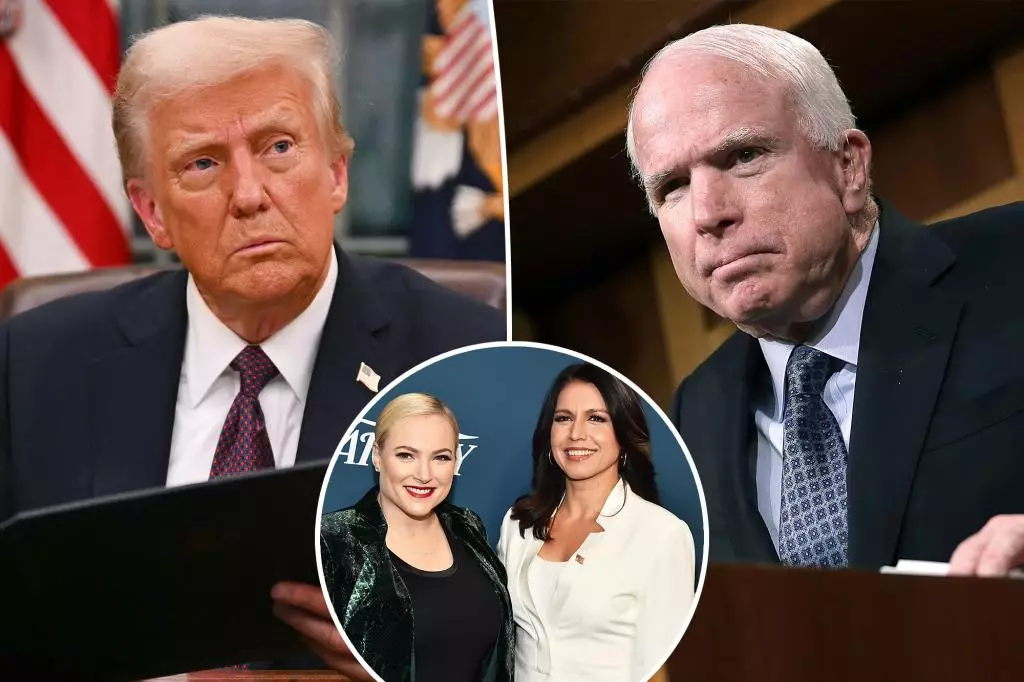The tensions between former President Donald Trump and the late Senator John McCain began in 2015, with Trump’s controversial comment regarding veterans who were captured in war. This remark sparked a prolonged feud that not only engulfed the two figures but also deeply affected their families and followers. Trump’s comment, “I like people who weren’t captured,” marked the beginning of a public rift that would color political discourse for years to come, particularly after McCain’s passing in 2018.
The feud escalated further when McCain, a celebrated war hero and former presidential candidate, famously voted against Trump’s efforts to repeal the Affordable Care Act, earning backlash from the Trump administration. Following McCain’s funeral, Trump expressed his displeasure at not being invited, lamenting the absence of a formal “thank you” for his tribute to the state funeral. Such sentiments elicited outrage from McCain’s family, particularly his daughter, Meghan McCain, who openly criticized Trump on multiple platforms.
Meghan McCain’s passionate defense of her father in light of Trump’s comments underscored the personal stakes involved in political disagreements. Her strong words, calling Trump “a piece of sh*t, election-denying huckster,” made it clear that the familial loyalties were tied not only to personal relationships but also to broader political ideologies. McCain’s widow, Cindy, spoke candidly about the enduring pain from Trump’s disparaging remarks, revealing that such public feuds often leave lasting scars on the families involved.
The impact of the feud extended beyond their immediate families, polarizing opinions among their respective supporters. On one hand, Trump supporters lauded his brash honesty and strength, while critics viewed his remarks as disrespectful to a decorated veteran. This dichotomy delineated a broader cultural divide in contemporary American politics, where personal grievances often interweave with partisan divides.
However, recent developments indicate a remarkable shift in this long-standing conflict. According to insiders, the appointment of Tulsi Gabbard as Director of National Intelligence, a figure dear to Meghan McCain, played an instrumental role in thawing the icy relations. As friends, McCain took it upon herself to campaign for Gabbard, engaging with senators and even appearing on conservative platforms to rally support for her friend.
Sources reveal that Meghan’s efforts caught the attention of the Trump administration, which acknowledged her pivotal role in securing Gabbard’s confirmation. The White House reportedly thanked her for bridging the gap between moderates and the administration, signifying an unexpected redemption arc in the fraught history between Trump and the McCain family.
The attendance of Meghan and her husband at Gabbard’s swearing-in ceremony in the Oval Office further highlights this unexpected thawing of relations. A personal message from Trump to Meghan illustrates a potential new chapter in political dynamics, where past grievances might be set aside for the sake of alliances and mutual goals.
In an age of pronounced divisiveness, such shifts elicit intrigue and hope. The evolving relationship between Trump and the McCains serves as a reminder that even the most entrenched rivalries may not be as immutable as they seem. As politics continues to evolve, this instance underscores the nuances inherent in human relationships and the potential for reconciliation amid a landscape often characterized by conflict.
